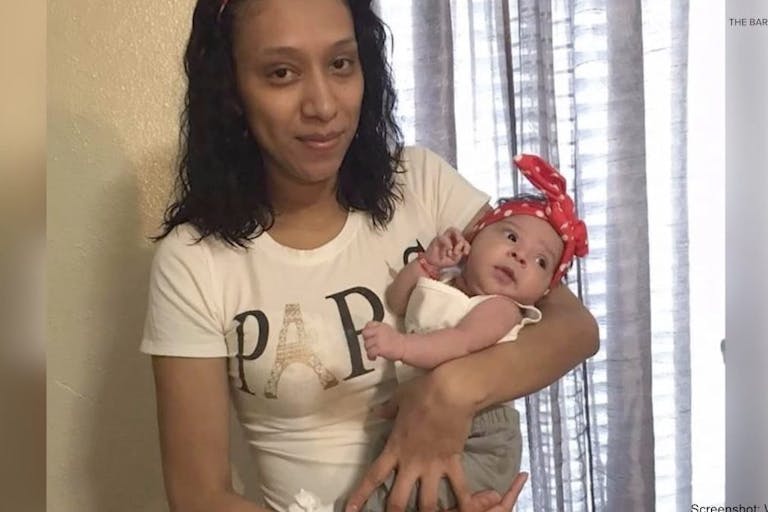I’m a board-certified OB-GYN currently practicing in Texas. I have been practicing for over 30 years and I have delivered over 5,000 babies. Allow me to shed some light on the harmful lies coming from the pro-abortion lobby. 1/9

Experts say this mom died from malpractice. ProPublica wants you to blame pro-lifers.
Experts say this mom died from malpractice. ProPublica wants you to blame pro-lifers.
Last month, ProPublica spread inaccurate information about two women (Amber Thurman and Candi Miller) who died tragically in Georgia after obtaining the abortion pill (one from a neighboring state and one from Aid Access) and receiving substandard care from doctors at a hospital with a poor reputation among pregnant women. Now, ProPublica is claiming that a Texas woman died in 2021 because of that state’s Heartbeat Act that had just taken effect at the time.
However, once again, this woman’s tragic story appears to be a heartbreaking and preventable case of medical malpractice.
Despite ProPublica’s attempts to blame such tragic complications on pro-life laws, the Associated Press admitted earlier this year that its own analysis revealed: “Serious violations that jeopardized a mother or her fetus’ heath occurred in states with and without abortion bans….”
At a Glance:
The Texas Heartbeat Law enacted in 2021 was signed into law in May and went into effect in September, with local and national media reporting on the law as well as its ‘medical emergency’ exception, leaving nearly four months for major medical organizations and hospitals to educate medical professionals about the law in the state. Both ignorance of the law and indignance about the law itself had the potential to affect treating patients properly.
The medical standard of care in this case does not appear to have been followed, and doctors have stated that nothing about the standard of care for treating miscarriage changed. Quotes from medical experts support this.
Despite the picture painted by ProPublica, medical emergencies during pregnancy — including those resulting in sepsis and even death — also occur in states without pro-life laws. Medical malpractice can happen anywhere, and unfortunately at any time.
Patient reviews of this hospital are mixed, with some having nightmarish experiences in both the emergency and obstetrics departments, and ProPublica even noted that to date, this hospital has not released information on whether it has a policy on how to properly treat miscarriages.
Current Texas law allows for induced abortions in medical emergencies under the physician’s “reasonable medical judgment.”
ProPublica has an agenda; they are looking for cases like this one, but only in pro-life states.
Ignorance or indignance? Knowing the law and the ‘medical emergency’ exception
The Texas Heartbeat Act took effect on September 1, 2021, the day before young, pregnant mother Josseli Barnica, a Honduran immigrant, went to the hospital while experiencing bleeding at 17 weeks and four days. She was reportedly sent home — but she returned to the hospital the following day after the bleeding worsened. It was then that she learned her cervix had almost fully dilated — a condition known as incompetent cervix, or cervical insufficiency.
Within two hours of her second visit to the hospital, an ultrasound showed “bulging membranes in the vagina with the fetal head in the open cervix.” The miscarriage was reportedly recorded by doctors as “in progress” and “inevitable,” but they failed to act at that time. Instead, ProPublica reported that Barnica was told that staff “had to wait until there was no heartbeat” before they could complete the already-in-progress delivery of her extremely premature baby.
If this is indeed what doctors said, they were horrifically and tragically incorrect.
The Texas Heartbeat Act (SB 8) did not prohibit preterm delivery due to preterm labor. The law was newly in effect and quite broad in allowing for a physician to exercise medical judgment, requiring the doctor to do the following as an “affirmative defense” if he or she believed an induced abortion to be necessary:
[M]ake written notations in the pregnant woman’s medical record of: (1) the physician’s belief that a medical emergency necessitated the abortion; and (2) the medical condition of the pregnant woman that prevented compliance with this subchapter (c) A physician performing or inducing an abortion under this section shall maintain in the physician’s practice records a copy of the notations made under Subsection (b).
(Oddly, ProPublica presented this expectation of documentation as if it is unreasonable to expect physicians to thoroughly document notes in a patient’s medical record and to retain a copy.)
Doctors and hospitals in Texas had over three months to familiarize themselves with the provisions of the Heartbeat Act before it took effect; it was signed into law on May 19, 2021, and did not go into effect until September 1, 2021. Various local news media and even CNN discussed the Heartbeat Act’s exception for “medical emergencies” months before the law actually went into effect. And other media knew the law well enough to publish articles nearly immediately after it went into effect, discussing the details of the law and even explaining that abortion would be allowed for “medical emergencies.” Buzzfeed, CNBC, The Wall Street Journal, Forbes, and The New York Times all reported on this, and all published their articles the same week that Barnica died.
In other words, the law’s exception for “medical emergencies” was well known, and had been well publicized for months prior to going into effect. Were physicians and hospitals still ignorant of the law, or simply indignant about it?
Dr. Ingrid Skop, a board-certified Texas OB/GYN and VP of Medical Affairs with the Charlotte Lozier Institute, who says she has delivered more than 5,000 babies over 30 years in Texas, posted to X that doctors are not prevented from intervening to save the life of a pregnant woman or treat miscarriages.
“After Texas enacted its pro-life law, the quality of medical care I provide did not change nor has the law prevented me from caring for my patients. This is true even in cases of pregnancy emergencies.”
Skop added that since the Dobbs decision, she has cared for women with ectopic pregnancies and performed surgeries to treat incomplete miscarriages and failed chemical abortions. She has taken action when a pregnancy complication threatened a woman’s life even when it was clear that the baby was too young to survive or “would not survive the action required to protect his mother.”
“Under every pro-life law, including in Texas, physicians can intervene to save women’s lives in pregnancy emergencies,” she wrote. “In fact, according to a recent Texas Health and Human Services Commission report, physicians reported 116 abortions for medical emergencies and physical health between July 2022 and May 2024.” No doctor was ever prosecuted.
Skop continued, “The pro-abortion lobby is trying to scare women into thinking they can’t be treated during a pregnancy emergency. The pro-abortion @acog [American College of Obstetricians and Gynecologists] also refuses to provide any guidance or support for doctors who are confused about these laws. The combination is deadly, and we’ve unfortunately seen women harmed as a result.”
Was the standard of care followed?
Barnica didn’t need to have her child killed by induced abortion. Instead, Barnica needed a doctor to assist in the completion of the delivery of her baby. The extensive dilation of her cervix for such a lengthy period of time left her vulnerable to potential infection. In many cases of cervical insufficiency, a cerclage (or stitching the cervix closed) would be attempted, but not in a case like Barnica’s, with nearly full dilation of the cervix.
Barnica’s baby was not far enough along in gestation to survive at just under 18 weeks — even with the most sophisticated, current medical interventions. With the miscarriage already imminent, and delivery unpreventable, this would necessitate the preterm delivery of the baby who was too young to survive; it would not have necessitated directly and intentionally killing the child by induced abortion.
In the article, ProPublica admits “the standard of evidence-based care” Barnica required was “speeding up labor with medication or a dilation and evacuation procedure to empty the uterus.” In Barnica’s case, Houston OB/GYN Dr. Shirley Lima eventually “delivered Barnica’s fetus, giving her medication to help speed up the labor” — shockingly 40 hours after she was admitted, and only after detecting no fetal heartbeat (which was not required for the law’s medical emergency exception). Assisting labor is not an abortion — but for Barnica, it appears that assistance came much too late.
A mere eight hours later, she was discharged by another OB/GYN, Dr. Joel Ross. Three days after that, she was dead.
The autopsy report allegedly shows Barnica died from “sepsis due to acute bacterial endometritis and cervicitis following spontaneous abortion [miscarriage] of a 17-week stillborn fetus (177 grams) with retained products of conception.” Doctors had not properly completed the delivery, and placental and pregnancy tissue remained in her uterus and became infected. It is important for those attending in an obstetric situation to examine the placenta for irregularities after delivery. And when warranted, the placenta may be sent to the pathology lab for further examination.
ProPublica stated that they asked doctors to review Barnica’s medical records and “all agreed that requiring Barnica to wait to deliver until after there was no detectable heartbeat violated professional medical standards because it could allow time for an aggressive infection to take hold. They said there was a good chance she would have survived if she was offered an intervention earlier.”
Pro-life medical experts weigh in
Skop told Live Action News, “As described, Josseli was suffering from an incomplete and inevitable miscarriage at 17 weeks. There is nothing medically that could be done to prevent this and she should have been offered an induction to complete the miscarriage. However, her doctors waited 40 hours until the child died before inducing delivery. Then she was sent home within 8 hours, and returned later with hemorrhage from retained POCs and died of sepsis.”
In Skop’s medical opinion, the fact that Barnica was forced to wait for labor assistance so long was negligent, as was the failure to examine the placenta. “… Allowing the prolonged introduction of bacteria through a dilated cervix led to the infection,” Skop said. “Failing to verify complete placental delivery led to the hemorrhage.”
Skop concluded (emphases added):
My experience has been that women sometimes do want to leave the hospital soon after a loss such as this, but her physicians should have ensured that she was clinically stable before allowing her to leave. That means no sign of infection, which could be predicted by her clinical course, and no excessive bleeding, which likely was happening because she retained part of her placenta. …
Poor quality care all around. As documented by ProPublica, this was medical malpractice.
The American Association of Pro-Life Obstetricians and Gynecologists also agrees that Barnica’s death was the result of negligence and malpractice — and not just on the part of physicians at this Houston hospital.
ProPublica claims that TX abortion law led to the tragic and preventable death of Josseli Barnica. Her death could have been prevented had her medical team been properly instructed. Our hearts go out to Josseli’s family. Read this 🧵on how doctors could have saved Josseli’s life.
In a thread on X, the organization wrote (emphases added):
ProPublica claims that TX abortion law led to the tragic and preventable death of Josseli Barnica. Her death could have been prevented had her medical team been properly instructed. Our hearts go out to Josseli’s family. Read this [thread] on how doctors could have saved Josseli’s life.
Josseli Barn[i]ca was in the middle of a spontaneous & inevitable miscarriage/delivery. TX law would have allowed her physicians her delivery because it was imminent. Pro-life laws across this country allowed this before & after the Dobbs opinion & TX abortion law…
Josseli’s cause of death lists sepsis from “retained products of conception.” When she delivered they left behind pregnancy tissue which caused or worsened her sepsis. She should have been seen for this, especially after she called in with complaints of ongoing bleeding.
Josseli was sent home only 8 hours after her delivery. This is not standard of care. If she had been kept in the hospital longer, it is likely that this complication could have been detected and appropriately treated.
Standard practice did not change. What changed is the intentional lack of guidance from professional medical organizations. They are committing malpractice by intentionally creating confusion to blame the laws — the consequence of their malpractice is the death of these women.
Again, is this the fault of a pro-life law that was passed (and about which the media had been reporting for months before it went into effect)? Or does the fault lie elsewhere?
“The pro-abortion lobby’s fearmongering paired with the lack of guidance from professional medical associations and hospitals are harming women,” noted Skop.
Article continues below
Dear Reader,
In 2026, Live Action is heading straight where the battle is fiercest: college campuses.
We have a bold initiative to establish 100 Live Action campus chapters within the next year, and your partnership will make it a success!
Your support today will help train and equip young leaders, bring Live Action’s educational content into academic environments, host on-campus events and debates, and empower students to challenge the pro-abortion status quo with truth and compassion.
Invest in pro-life grassroots outreach and cultural formation with your DOUBLED year-end gift!
Medical emergencies and sepsis aren’t limited to pro-life states
According to the Centers for Disease Control and Prevention (CDC), maternal sepsis is a leading cause of death among pregnant women across the globe and causes 261,000 deaths each year.
Data from the Sepsis Alliance shows that 23% of in-hospital maternal deaths are related to sepsis. In addition, research reveals that since 1998, there has been an increase in the number of cases of maternal sepsis and maternal deaths related to sepsis. It is believed these cases are linked to an increase in chronic health conditions including kidney disease, liver disease, and congestive heart failure among pregnant women. Research has also revealed that many mothers develop sepsis due to medical neglect at the hands of doctors and medical staff.
One point ProPublica failed to make is that tragedies occur in states that are not as protective of preborn lives (like Maryland, Nebraska, and more) just as they do in pro-life states.
In March of this year, former Kansas City Chiefs cheerleader Krystal Anderson died from sepsis shortly after learning her preborn daughter had died at 20 weeks (known as a stillbirth). It wasn’t until hours later that doctors noticed Anderson was displaying signs of “severe sepsis,” and carried out a procedure to remove the deceased baby. Abortion is legal until 22 weeks in Kansas, but since her baby had already died, the procedure was not considered an abortion. Anderson tragically died anyway.
In pro-abortion New Jersey in 2011, 29-year-old Tara Hanson died from sepsis six days after giving birth to her first child even after telling hospital staff that she didn’t feel right and was feverish and fatigued.
And in the extremely pro-abortion New York City, nine pregnant women died from sepsis in 2020 alone.
Hospital policies and problems
This hospital — HCA Houston Healthcare Northwest on Cypress Creek Parkway in Houston — which has received a significant number of extremely poor reviews for providing inadequate care, appears to have failed Barnica so severely that she died. Indeed, ProPublica states, “Even three years after Barnica’s death, HCA Healthcare, the hospital chain that treated Barnica, will not disclose whether it has a policy on how to treat miscarriages.”
And yet, based on a Live Action News survey of Google Reviews from patients of this hospital, it seems there has been nearly a decade of inconsistent care offered and received at the facility, particularly in the hospital’s emergency department. In the obstetrics department, some women reported positive experiences, while others noted horrific treatment. The reviews are either glowing or absolutely horrific.
Hemorrhage
Nine years ago, this patient wrote that because the nurses insisted on waiting for the doctor to deliver the patient’s baby, the woman’s husband had to step in and help his wife deliver the baby as their child’s head was emerging. “The baby came out healthy thank GOD even [though] she poop[ed] inside and they took a long time to take her out, because the incompetent staff who didn’t do [their]job,” she wrote. “The doctor decided to show up just to leave my placenta there for one hour or two and then left again while I was bleeding for 3 hours with my legs still open blood everywhere like if it was some kind of horror movie or meat market, she still keep coming back and forward and every time she put her whole hand inside many time[s] and take more blood out….” She then says she passed out.
They asked for another doctor to assist them and were told there was no other doctor available. The woman had lost so much blood that she passed out again after being made to walk down the hallway to use the restroom. “I [passed] out 2 times in the restroom floor, and the second they took a long time to wake me up. After 2 day[s] no one went and clean[ed] [the] room or the bloody restroom…. THINK TWICE BEFORE YOU GO HAVE YOUR BABY THERE PLEASE.”

Didn’t follow C-section protocol
This woman said she had her third c-section there and “was practically rushed out of the hospital; none of the protocols for a c-section [were] followed. I didn’t spend a full two days in the hospital and go home and before a week was over got a stomach virus… the nurses barely came into the room to do anything… I’ll never go back to that doctor and this hospital.”

Inexperienced staff
Three months ago, a patient said the hospital “let new nurses with no experience help you push out your baby. My baby’s head was so deformed due to a nurse not knowing how to properly let me push. then on top of that I had to have my baby naturally with no epidural due to the fact she didn’t pay attention to how far I had dilated.”

Unprofessional staff
A month ago, a woman said she was 39 weeks pregnant (first time) and said the nurses in the OB ward were “rude” and “very unprofessional” and when she asked why no one was assisting her, she was told “no one knew I was in the room.” She encouraged people to go to a different hospital for better quality service.

Caring for patients without intentional killing, and exercising ‘reasonable medical judgment’
ProPublica wrote, “This year, after being directed to do so by the state Supreme Court, the Texas Medical Board released new guidance telling doctors that an emergency didn’t need to be ‘imminent’ in order to intervene and advising them to provide extra documentation regarding risks. But in a recent interview, the board’s president, Dr. Sherif Zaafran, acknowledged that these efforts only go so far and the group has no power over criminal law: ‘There’s nothing we can do to stop a prosecutor from filing charges against the physicians.'”
The law in Texas that went into effect after the Dobbs decision overturned Roe v. Wade has different stipulations related to exceptions. Abortion is no longer allowed in Texas except if a “licensed physician” exercises “reasonable medical judgment” to determine that (emphases added):
… the pregnant female on whom the abortion is performed, induced, or attempted has a life-threatening physical condition aggravated by, caused by, or arising from a pregnancy that places the female at risk of death or poses a serious risk of substantial impairment of a major bodily function unless the abortion is performed or induced; and
(3) the person performs, induces, or attempts the abortion in a manner that, in the exercise of reasonable medical judgment, provides the best opportunity for the unborn child to survive unless, in the reasonable medical judgment, that manner would create:
(A) a greater risk of the pregnant female’s death; or
(B) a serious risk of substantial impairment of a major bodily function of the pregnant female.
(c) A physician may not take an action authorized under Subsection (b) if, at the time the abortion was performed, induced, or attempted, the person knew the risk of death or a substantial impairment of a major bodily function described by Subsection (b)(2) arose from a claim or diagnosis that the female would engage in conduct that might result in the female’s death or in substantial impairment of a major bodily function.
(d) Medical treatment provided to the pregnant female by a licensed physician that results in the accidental or unintentional injury or death of the unborn child does not constitute a violation of this section.
Let’s repeat that last section: “Medical treatment provided to the pregnant female by a licensed physician that results in the accidental or unintentional injury or death of the unborn child does not constitute a violation of this section.”
This means that absolutely no medical professional in Texas should hesitate to treat a patient in Barnica’s situation.
And despite claims to the contrary, an ectopic pregnancy would fall under this section of exceptions, given that it is potentially fatal to the mother. When a mother’s life is in danger, it is not necessary to kill her baby before performing a procedure in an effort to save both lives, or to remove an ectopic pregnancy.
What’s the agenda?
Abortion advocates and media outlets like ProPublica continue to stoke fears that doctors will be arrested for treating patients, but no doctor in Texas or the other 20 states that protect preborn children from abortion have been prosecuted for violating pro-life laws. ProPublica admits this, but still claims that “the possibility looms over their every decision.”
It’s obvious that ProPublica has been seeking out tragic cases of medical neglect that it can exploit in order to promote unlimited abortion, and has also been looking for doctors who claim they can’t practice medicine without intentionally killing preborn children. ProPublica stated that “Texas has a committee of maternal health experts who review such deaths to recommend ways to prevent them… the committee’s reports on individual cases are not public and members said they have not finished examining cases from 2021, the year Barnica died.”
But, since all of this is about furthering a pro-abortion agenda — which ProPublica openly admits — rather than wait for Texas’ health experts to review anything, ProPublica obtained records themselves, writing (emphasis added), “ProPublica is working to fill gaps in knowledge about the consequences of abortion bans. Reporters scoured death data, flagging Barnica’s case for its concerning cause of death: ‘sepsis’ involving ‘products of conception.’ We tracked down her family, obtained autopsy and hospital records and enlisted a range of experts to review a summary of her care that ProPublica created in consultation with two doctors.”
ProPublica would like you to believe pro-lifers and pro-life laws are the cause of medical negligence. But is ProPublica willing, in the interest of true journalism, to dig into medical and autopsy records of women’s deaths in states without pro-life laws (like those mentioned previously) to see the full picture? Don’t bet on it. They don’t want to know about the actual consequences of abortion — just the alleged consequences of “abortion bans.”
Editor’s Note: Special thanks to Live Action Research Fellow Carole Novielli and team for research contributions to this article. Candi Miller obtained the abortion pill from Aid Access; we have corrected this error.
Live Action News is pro-life news and commentary from a pro-life perspective.
Contact editor@liveaction.org for questions, corrections, or if you are seeking permission to reprint any Live Action News content.
Guest Articles: To submit a guest article to Live Action News, email editor@liveaction.org with an attached Word document of 800-1000 words. Please also attach any photos relevant to your submission if applicable. If your submission is accepted for publication, you will be notified within three weeks. Guest articles are not compensated (see our Open License Agreement). Thank you for your interest in Live Action News!
Read Next

Vietnamese Catholics widen support for pregnant mothers
Angeline Tan
·More In Fact Checks

Fact Checks
FACT CHECK: Tierra Walker's death was tragic, preventable, and not due to pro-life laws
Nancy Flanders
·
Fact Checks
FACT CHECK: Are pro-life laws a sign of an authoritarian government?
Nancy Flanders
·
Fact Checks
Do most doctors in Malta really support abortion? Here are the facts.
Cassy Cooke
·
Fact Checks
Fact Check: Critics claim Baby Olivia isn’t based on ‘medical fact’ and is ‘brainwashing’ children
Madison Evans
·
Fact Checks
The Associated Press spreads misconceptions about pregnancy centers
Nancy Flanders
·More From The Editors

Media
The Live Action Women’s Summit is a call to courageously defend life and truth
The Editors
·
Fact Checks
ProPublica exploits another mother’s death by ‘substandard medical care’ in attempt to blame pro-life law
The Editors
·
Analysis
FACT CHECK: Did Georgia’s pro-life law kill a young mom?
The Editors
·
Politics
Quote of the day: Hillary Clinton “reveals a mindset that lacks any compassion for unborn children”
The Editors
·
Opinion
Quote of the Day: “You are strong enough to be a mother and finish your education”
The Editors
·